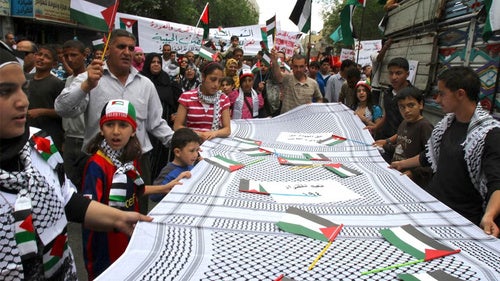Jordan Fears Israel-Hamas War Could Reach its Borders

Jordan is seen as a stable country in the Middle East. There are concerns the Israel-Hamas war could change that.
In short: Jordan, which shares a border with the West Bank and Israel, fears the Israel-Hamas war could spill over to its country. Of particular concern is the potential for an influx of Palestinian refugees, which Jordan has stated it would not accept. Jordan is already home to the world’s second-largest per capita number of refugees, and it has a large Palestinian population, due in part to past refugee resettlement waves dating back as far as the 1940s. Jordan has been a longtime U.S. ally and source of stability in the Middle East but is already facing challenges that could be exacerbated by any spillover from the Israel-Hamas war.
What role does Jordan play in the Middle East?
Jordan has long been considered one of the most stable countries in the Middle East. It has a deep history of allyship with the West, and it has cooperated with Israel on several notable occasions. Jordan signed an armistice with Israel in 1949 that ended the First Arab-Israeli War, and in 1994, it became just the second country in the Middle East to begin official diplomatic relations with Israel. The peace treaty that launched that diplomacy is considered one of the few successes of the peace talks between Israel and its neighbors in the 1990s, although Jordanian-Israeli relations have been eroding in recent years.
The overall perception of stability in Jordan has also been somewhat shaken recently, amid a struggling economy, high youth unemployment, and repressive freedom-of-expression laws. However, the United Nations Population Fund still defines the country as a steady force in the region, stating, “Jordan has a reputation for dynamism, moderation and peace brokering in the Middle East.”
Jordan also accepts many refugees, especially those from Syria, and is home to the second-largest number of refugees per capita – meaning that, of all the nations on Earth, it has the second-highest ratio of refugees compared to its entire population. According to the United Nations’ refugee agency, there are 760,000 refugees in Jordan, 88.5% of whom are from Syria.
Why is Jordan concerned about conflict in the Palestinian territories?
Like most Middle Eastern countries, Jordan supports the creation of a Palestinian state. Because of this, Jordanians worry that the Israel-Hamas war and violence in the West Bank will lead to a forced “permanent expulsion” of Palestinians from the occupied territories, ending any chance of an independent Palestine. Such an expulsion would also send an influx of refugees into Jordan, which Jordan has stated it won’t accept.
Jordan’s King Abdullah II has pushed back on accepting any Palestinian refugees, saying “No refugees in Jordan, no refugees in Egypt,” and the country’s prime minister, Bisher al Khasawneh, has warned that any actions and conditions that lead to the mass displacement of Palestinians would pose an “existentialist threat” that violates Jordan’s 1994 peace treaty with Israel.
It’s important to note, though, that Jordan’s refusal to accept these refugees is not rooted in prejudice against Palestinians. Rather, as explained by the Carnegie Endowment for International Peace, the policy is “a countermove to deny Israel the opportunity to empty the West Bank and Gaza of as many Palestinians as possible.”
In prior incidents where Palestinians have been displaced en masse, Jordan has been a top destination for refugee resettlement. During the 1948 Nakba, 750,000 Palestinians were forced to leave their homes after Israel declared itself an independent nation and began annexing land that had been set aside for a Palestinian state. Many of these Palestinians fled into the Gaza Strip, the West Bank, or neighboring countries, including Jordan, which saw its population triple.
During the 1967 Six-Day War between Israel, Syria, and Jordan, 300,000 more Palestinians were displaced and once again fled to neighboring countries like Jordan.
According to the United Nations Relief and Works Agency, there are over 2 million Palestinian refugees in Jordan today, the most of any country where the agency works. The permanent population of Jordan also includes many people of Palestinian descent. Overall, one in five people in Jordan is Palestinian, including Queen Rania Al Abdullah, who was born in Kuwait to Palestinian parents.
What challenges is Jordan already facing?
Jordan is already facing a stagnant economy and a youth unemployment rate of nearly 42%, along with an “authoritarian slide” in its government, a monarchy with one elected legislative chamber that “wields little power in practice,” according to U.S.-based nonprofit Freedom House,” according to U.S.-based nonprofit Freedom House.
Freedom House, which evaluates every country’s freedom level based on multiple criteria pertaining to political rights and civil liberties, listed Jordan as “partly free” in 2020, but has labeled the country “not free” in every year since.
There’s also concern that Jordan could soon face increased financial responsibility in the management of its refugee population. The United Nations Relief and Works Agency, which provides aid to the millions of Palestinian refugees in the Middle East, has faced significant funding cuts in recent months. Amid the agency’s budget issues, some fear that the cost of caring for refugees will increasingly fall on the countries that house them, including Jordan.
Amid the Israel-Hamas war, and the death toll in Gaza surpassing 30,000, new public opinion insights show that disagreement over the conflict could also pose challenges for Jordan.
There are signs of and concern for growing Hamas sympathies, and a recent study on public opinion in 16 Arab countries about the Israel-Hamas conflict – the first survey of its kind – found discernible opposition to Jordan’s role in the war. According to the survey, that Arabs are split on Jordan’s response to the war but are in a near-consensus in opposing Jordan’s recognition of Israel. Notably, 51% of poll respondents view the U.S. as the biggest threat to peace and stability within the region, followed by Israel at 26%.



